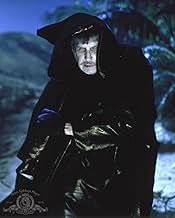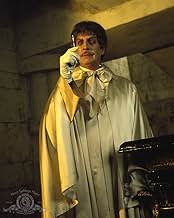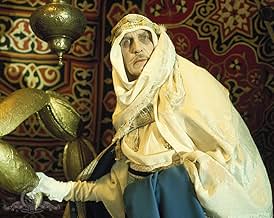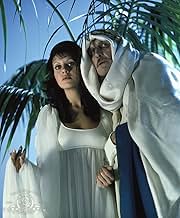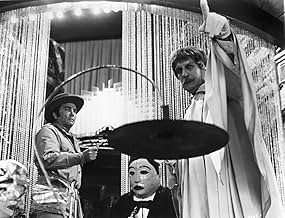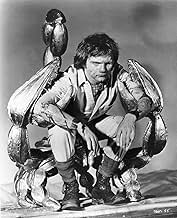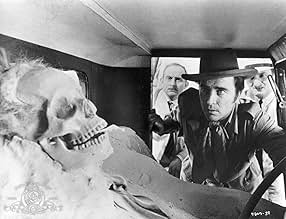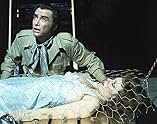PUNTUACIÓN EN IMDb
6,3/10
7,6 mil
TU PUNTUACIÓN
Añade un argumento en tu idiomaThe vengeful doctor rises again, seeking the Scrolls of Life in an attempt to resurrect his deceased wife.The vengeful doctor rises again, seeking the Scrolls of Life in an attempt to resurrect his deceased wife.The vengeful doctor rises again, seeking the Scrolls of Life in an attempt to resurrect his deceased wife.
- Dirección
- Guión
- Reparto principal
- Premios
- 1 premio y 2 nominaciones en total
John Comer
- Ship's Officer
- (sin acreditar)
Caroline Munro
- Victoria Regina Phibes
- (sin acreditar)
Gary Owens
- Narrator
- (voz)
- (sin acreditar)
Reseñas destacadas
Years after going into hibernation, Dr. Phibes comes back to life and so has his fashionable female assistant Vulnavia (too bad she has only one other acting credit, "The Great Muppet Caper").
How Vulnavia survived the acid attack from the first film, I have no idea. Anyway, together they travel to Egypt to find the river of life that flows once every 2000 years in order to resurrect Phibes' wife Victoria. Biederbeck, running out of water from the last two thousand years, is racing to get there first. Who will win? Depending on how you look at this, the movie is either awesome or campy or both. I think both. Vincent Price (Dr. Phibes) never fails as a mad scientist and Phibes is a good character to demonstrate this. The supporting cast is also well-picked (with even a cameo from Peter Cushing). And the deaths are particularly cruel -- scorpions, snakes and one of the most painful ways to die you have seen (which involves crushing but you will have to check it out for yourself). Price, good deaths and a smoking hot woman. What more do you want? Well, there's the camp aspect. So many questions are raised here, besides how Vulnavia survived and where she was hiding. How does Phibes survive undetected if his house is torn down? How does he build so many elaborate traps in Egypt? How does he hide the bodies so quickly? And then there's the Clockwork Wizards (his robot friends who play instruments with him as he plays his organ). They are great (and call to mind Argento's "Deep Red") but it seems unlikely they would be able to be transported with such ease.
Oh, and if Phibes needs his special tool to speak, why does he ever disconnect it? It is not like it gets in the way or something, except maybe while sleeping.
You like Vincent Price. You like 1970s horror films from American International Pictures. You will like this film. Some say it's not as solid as the first, other say it's on par. I would suggest seeing the first one first (that makes sense) but there's no reason to avoid this film. It deserved more sequels, but this was not to be.
How Vulnavia survived the acid attack from the first film, I have no idea. Anyway, together they travel to Egypt to find the river of life that flows once every 2000 years in order to resurrect Phibes' wife Victoria. Biederbeck, running out of water from the last two thousand years, is racing to get there first. Who will win? Depending on how you look at this, the movie is either awesome or campy or both. I think both. Vincent Price (Dr. Phibes) never fails as a mad scientist and Phibes is a good character to demonstrate this. The supporting cast is also well-picked (with even a cameo from Peter Cushing). And the deaths are particularly cruel -- scorpions, snakes and one of the most painful ways to die you have seen (which involves crushing but you will have to check it out for yourself). Price, good deaths and a smoking hot woman. What more do you want? Well, there's the camp aspect. So many questions are raised here, besides how Vulnavia survived and where she was hiding. How does Phibes survive undetected if his house is torn down? How does he build so many elaborate traps in Egypt? How does he hide the bodies so quickly? And then there's the Clockwork Wizards (his robot friends who play instruments with him as he plays his organ). They are great (and call to mind Argento's "Deep Red") but it seems unlikely they would be able to be transported with such ease.
Oh, and if Phibes needs his special tool to speak, why does he ever disconnect it? It is not like it gets in the way or something, except maybe while sleeping.
You like Vincent Price. You like 1970s horror films from American International Pictures. You will like this film. Some say it's not as solid as the first, other say it's on par. I would suggest seeing the first one first (that makes sense) but there's no reason to avoid this film. It deserved more sequels, but this was not to be.
Not as good as the first Phibes movie (The Abominable Dr...) but jolly good fun, so long as you're not expecting a horror movie! This is a comedy! The double act of Peter Jeffrey and John Cater as the bumbling police officers Trout and Waverley are a joy. Vincent Price, himself, often portrayed his characters with tongue firmly in cheek, (witness the AIP Corman series of E A Poe titles) and this is no exception. What I would like to know is what is the obsession with dance band leaders and jazz cornet/trumpeters all about? OK, its set in the 20s, (allegedly!) and the mechanical band look like an old dance band of the time, or is it just another in-joke probably lost on most viewers? I'll explain: Beiderbeck (Bix Beiderbecke - legendary cornettist, who died of drink at 28); Hackett (Bobby Hackett - cornettist often compared to Bix for his lyrical style); Baker (Harold "Shorty" Baker - one-time trumpeter for Duke Ellington. Or even Kenny Baker, English trumpeter of considerable ability); Shavers (Charlie Shavers - highly accomplished trumpeter from the 'swing era'); Stewart (Rex Stewart - cornettist with Duke Ellington during 30s/40s). Get the picture? Then we have two band leaders: Ambrose (English dance band leader from the 30s) and Lombardo (Guy Lombardo, Canadian dance band leader from the 20s and 30s). Obsessive or what? Never mind, I just thought I'd point it out!!!! Its still an enjoyable load of old nonsense all the same. 10 out of 10 for cheekiness, but overall a 7.
Just saw the movie on DVD. I have never seen it before and I am glad I found it. Of course this is an almost unnecessary re-working of the first movie but it is great for those like myself who can't get enough of Vincent Price's Phibes.
The British cast is very stiff here and the almost chanting 'Harvard Univeristy drama teacher' voice of American actor Vincent Price (when he is thinking/transmitting to Vulnavia as opposed to the stark tone when he uses his electromechanical speaking apparatus) provides grandeur and menace. This is a very challenging role since the story is badly underwritten (everything just exists and appears, no explanations), the dialog is pompous and overwritten and Price must work with no facial expression (or better: with an absolute minimum). He did that with bravura in the first pic and he only slips during the opening close ups at the organ where his facial muscles move a little too much, but I still accept it.
I must admit that I had some difficulties watching such a low budget movie. First I didn's understand what happened. What? The house is in rubbles, torn apart by the villain who stole the papyrus? When? The house was there just a second ago. I thought it was meant to be some kind of theatrical language I didn't understand. To my embarrassment on second viewing I found out that Price says: 'Let's go upstairs' and the organ, like in the first movie acts as an elevator. I missed the visual explanation.
The shot which shows Phibes and the new Vulnavia (where the heck does the beautiful female servant come from? Is she a ghost? Sure not: the writers couldn't come up with any explanation.
Period) rising into the rubbles clearly is a camera moving downward and there is a pitch black background. I needed to re-learn to listen more to dialog. The visual overload of today is hazardous to these kind of films which of course have worked much better in their time.
I agree with most of the comments that state that the deaths are less imaginative than in the first movie but I like this fact that this sequel was made only two years after the original - the look and feel are similar even if some of the lushness is missing.
I like the two policemen acting as a semi working-class, people with a common sense and humor, counterbalance to the Gothic "Phantom of the Opera style" Phibes. I like the way they have given up trying to catch Phibes and these of course are the two we can identify with, yet there is too little material here and some of the scenes with the policemen look like a family gathering from the first movie and of course as in so many sequels: the acting becomes a little too self aware.
The villain, his hoping-to-be wife and his henchmen are all very dull characters so this is basically a Vincent Price/Peter Jeffrey movie with wasted but welcome guest appearances from Terry-Thomas and Peter Cushing. Both wonderful actors with careers mostly made of making the most of bad material.
The 1970s version of late 1920s British Art Deco (since the Paris-fair that introduced the Art Deco style was held in 1925, I'd say it should be rather early 1930s but the cars look more late 20s in both movies) plus the theatrical, magical, Gothic, deep menace of the price-less (pun not intended) Phibes as only Price could have played makes this very low budget film a little treasure, even if it's basically only for those, like me, who can't get enough of the magical world of the wonderfully abominable Dr. Phibes.
The British cast is very stiff here and the almost chanting 'Harvard Univeristy drama teacher' voice of American actor Vincent Price (when he is thinking/transmitting to Vulnavia as opposed to the stark tone when he uses his electromechanical speaking apparatus) provides grandeur and menace. This is a very challenging role since the story is badly underwritten (everything just exists and appears, no explanations), the dialog is pompous and overwritten and Price must work with no facial expression (or better: with an absolute minimum). He did that with bravura in the first pic and he only slips during the opening close ups at the organ where his facial muscles move a little too much, but I still accept it.
I must admit that I had some difficulties watching such a low budget movie. First I didn's understand what happened. What? The house is in rubbles, torn apart by the villain who stole the papyrus? When? The house was there just a second ago. I thought it was meant to be some kind of theatrical language I didn't understand. To my embarrassment on second viewing I found out that Price says: 'Let's go upstairs' and the organ, like in the first movie acts as an elevator. I missed the visual explanation.
The shot which shows Phibes and the new Vulnavia (where the heck does the beautiful female servant come from? Is she a ghost? Sure not: the writers couldn't come up with any explanation.
Period) rising into the rubbles clearly is a camera moving downward and there is a pitch black background. I needed to re-learn to listen more to dialog. The visual overload of today is hazardous to these kind of films which of course have worked much better in their time.
I agree with most of the comments that state that the deaths are less imaginative than in the first movie but I like this fact that this sequel was made only two years after the original - the look and feel are similar even if some of the lushness is missing.
I like the two policemen acting as a semi working-class, people with a common sense and humor, counterbalance to the Gothic "Phantom of the Opera style" Phibes. I like the way they have given up trying to catch Phibes and these of course are the two we can identify with, yet there is too little material here and some of the scenes with the policemen look like a family gathering from the first movie and of course as in so many sequels: the acting becomes a little too self aware.
The villain, his hoping-to-be wife and his henchmen are all very dull characters so this is basically a Vincent Price/Peter Jeffrey movie with wasted but welcome guest appearances from Terry-Thomas and Peter Cushing. Both wonderful actors with careers mostly made of making the most of bad material.
The 1970s version of late 1920s British Art Deco (since the Paris-fair that introduced the Art Deco style was held in 1925, I'd say it should be rather early 1930s but the cars look more late 20s in both movies) plus the theatrical, magical, Gothic, deep menace of the price-less (pun not intended) Phibes as only Price could have played makes this very low budget film a little treasure, even if it's basically only for those, like me, who can't get enough of the magical world of the wonderfully abominable Dr. Phibes.
I bought this one as part of a back to back Dr. Phibes Midnight Feature DVD. I didn't like it quite as much as the original, but it was not completely without its charm. Vincent Price's performance was good (as per usual) and Robert Quarry did well as Biderbeck (Dr. Phibes' foe in this film). As anyone who has seen the original can guess, there's a lot of really elaborate deaths and more of Vincent Price talking through a machine plugged into his neck.
The film picks up with a brief recap of the original (Phibes out to kill the doctors who where operating on his wife when she died). Phibes then arises from the tomb in his basement where he and his wife's corpse were resting for about three years. Phibes has a plan this time to find a secret river of life in Egypt that comes to a pharaoh's tomb once every 2000 years so he can bring his wife back to life and have eternal life. However, Phibes' house has been demolished and a priceless scroll that had the secret of the tomb has been taken. Biderbeck (Quarry) somehow acquired the scroll and intends to find the river for himself and his girlfriend. Both travel to Egypt to find the river of life, and Phibes kills Biderbeck's lackeys along the way in his usual methods.
It's not that bad. It didn't live up to the original, but it still delivered big on the theme deaths. The deaths aren't quite as structured as in the last Phibes film, but they're still pretty fun.
The film picks up with a brief recap of the original (Phibes out to kill the doctors who where operating on his wife when she died). Phibes then arises from the tomb in his basement where he and his wife's corpse were resting for about three years. Phibes has a plan this time to find a secret river of life in Egypt that comes to a pharaoh's tomb once every 2000 years so he can bring his wife back to life and have eternal life. However, Phibes' house has been demolished and a priceless scroll that had the secret of the tomb has been taken. Biderbeck (Quarry) somehow acquired the scroll and intends to find the river for himself and his girlfriend. Both travel to Egypt to find the river of life, and Phibes kills Biderbeck's lackeys along the way in his usual methods.
It's not that bad. It didn't live up to the original, but it still delivered big on the theme deaths. The deaths aren't quite as structured as in the last Phibes film, but they're still pretty fun.
...as the original. Yes, the design is impressive. Yes, Phibes is nearly as good. The Biederbeck sub-plot (Robert Quarry's best performance by far: check his IMDB credits list to see how many turkeys he's been in) is interesting, and makes him a suitable rival for Phibes. Sort of.
And that's kind of where I'm stuck at. Everything in this movie is "sort of." Biederbeck is "sort of" Phibes' rival, but the two never meet until the end. The movie "sort of" carries on the theme of the original. But without a driving force or motivation of vengeance, or a theme like the Plagues, here it's just a matter of seeing how many nifty ways Phibes can (rather implausibly) knock someone off. And some of those (a raven?) aren't even that interesting.
The humor here is also a lot broader, which wasn't really to my taste, either. Watching Phibes chow down on grapes through his neck hole and almost choking struck me as parodying the character itself, which tends to rob Phibes of much of his menace.
Overall, this sequel is enjoyable, but to me, it ultimately fails to rise to level of its predecessor.
And that's kind of where I'm stuck at. Everything in this movie is "sort of." Biederbeck is "sort of" Phibes' rival, but the two never meet until the end. The movie "sort of" carries on the theme of the original. But without a driving force or motivation of vengeance, or a theme like the Plagues, here it's just a matter of seeing how many nifty ways Phibes can (rather implausibly) knock someone off. And some of those (a raven?) aren't even that interesting.
The humor here is also a lot broader, which wasn't really to my taste, either. Watching Phibes chow down on grapes through his neck hole and almost choking struck me as parodying the character itself, which tends to rob Phibes of much of his menace.
Overall, this sequel is enjoyable, but to me, it ultimately fails to rise to level of its predecessor.
¿Sabías que...?
- CuriosidadesThere was a lot of hostility between Vincent Price and Robert Quarry, particularly when Price discovered that American International Pictures was planning to replace him with Quarry as their major horror film star. At one point, when Price discovered Quarry singing opera, Quarry said "I'll bet you didn't know I could sing, did you?", to which Price replied "Well, I knew you weren't a fucking actor."
- PifiasAt the end of the film, which takes place in 1928, Phibes sings "Somewhere Over The Rainbow", a song that was first recorded in 1938, 10 years later.
- Citas
Inspector Trout: I'm a bit apprehensive about finding the others, sir. Do you think you know where we are?
Sir Wayne Waverley: Trout, I don't think; I know.
Inspector Trout: I don't think you know either, sir.
- Créditos adicionalesThis time, Phibes laughs just before the last chord of the music after the credits.
- Versiones alternativasIn later prints of the film and in the original home video version of it, a scene featuring Vincent Price singing "Somewhere Over the Rainbow" is removed, supposedly for copyright reasons. The film's 2001 DVD version restores the Vincent Price-sung song "Somewhere Over the Rainbow".
- ConexionesEdited from El abominable Dr. Phibes (1971)
- Banda sonoraOver the Rainbow
(uncredited)
Music by Harold Arlen
Performed by Vincent Price
(played over the end titles)
Selecciones populares
Inicia sesión para calificar y añadir a tu lista para recibir recomendaciones personalizadas
- How long is Dr. Phibes Rises Again?Con tecnología de Alexa
Detalles
Contribuir a esta página
Sugerir un cambio o añadir el contenido que falta

Principal laguna de datos
By what name was El regreso del Dr. Phibes (1972) officially released in India in English?
Responde


